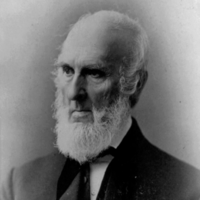How the Women Went From Dover
THE tossing spray of Cocheco’s fall
Hardened to ice on its rocky wall,
As through Dover town in the chill, gray dawn,
Three women passed, at the cart-tail drawn!
Bared to the waist, for the north wind’s grip
And keener sting of the constable’s whip,
The blood that followed each hissing blow
Froze as it sprinkled the winter snow.
Priest and ruler, boy and maid
Followed the dismal cavalcade;
And from door and window, open thrown,
Looked and wondered gaffer and crone.
‘God is our witness,’ the victims cried,
We suffer for Him who for all men died;
The wrong ye do has been done before,
We bear the stripes that the Master bore!
And thou, O Richard Waldron, for whom
We hear the feet of a coming doom,
On thy cruel heart and thy hand of wrong
Vengeance is sure, though it tarry long.
‘In the light of the Lord, a flame we see
Climb and kindle a proud roof-tree;
And beneath it an old man lying dead,
With stains of blood on his hoary head.’
‘Smite, Goodman Hate-Evil!—harder still!’
The magistrate cried, ‘lay on with a will!
Drive out of their bodies the Father of Lies,
Who through them preaches and prophesies!’
So into the forest they held their way,
By winding river and frost-rimmed bay,
Over wind-swept hills that felt the beat
Of the winter sea at their icy feet.
The Indian hunter, searching his traps,
Peered stealthily through the forest gaps;
And the outlying settler shook his head,—
'They’re witches going to jail,' he said.
At last a meeting-house came in view;
A blast on his horn the constable blew;
And the boys of Hampton cried up and down,
‘The Quakers have come!’ to the wondering town.
From barn and woodpile the goodman came;
The goodwife quitted her quilting frame,
With her child at her breast; and, hobbling slow,
The grandam followed to see the show.
Once more the torturing whip was swung,
Once more keen lashes the bare flesh stung.
‘Oh, spare! they are bleeding!’ a little maid cried,
And covered her face the sight to hide.
A murmur ran round the crowd: ‘Good folks,’
Quoth the constable, busy counting the strokes,
‘No pity to wretches like these is due,
They have beaten the gospel black and blue!’
Then a pallid woman, in wild-eyed fear,
With her wooden noggin of milk drew near.
‘Drink, poor hearts!’ a rude hand smote
Her draught away from a parching throat.
‘Take heed,’ one whispered, 'they’ll take your cow
For fines, as they took your horse and plough,
And the bed from under you.' ‘Even so,’
She said; ‘they are cruel as death, I know.’
Then on they passed, in the waning day,
Through Seabrook woods, a weariful way;
By great salt meadows and sand-hills bare,
And glimpses of blue sea here and there.
By the meeting-house in Salisbury town,
The sufferers stood, in the red sundown,
Bare for the lash! O pitying Night,
Drop swift thy curtain and hide the sight.
With shame in his eye and wrath on his lip
The Salisbury constable dropped his whip.
‘This warrant means murder foul and red;
Cursed is he who serves it,’ he said.
‘Show me the order, and meanwhile strike
A blow at your peril!’ said Justice Pike.
Of all the rulers the land possessed,
Wisest and boldest was he and best.
He scoffed at witchcraft; the priest he met
As man meets man; his feet he set
Beyond his dark age, standing upright,
Soul-free, with his face to the morning light.
He read the warrant: ‘These convey
From our precincts; at every town on the way
Give each ten lashes.’ ‘God judge the brute!
I tread his order under my foot!
’Cut loose these poor ones and let them go;
Come what will of it, all men shall know
No warrant is good, though backed by the Crown,
For whipping women in Salisbury town!'
The hearts of the villagers, half released
From creed of terror and rule of priest,
By a primal instinct owned the right
Of human pity in law’s despite.
For ruth and chivalry only slept,
His Saxon manhood the yeoman kept;
Quicker or slower, the same blood ran
In the Cavalier and the Puritan.
The Quakers sank on their knees in praise
And thanks. A last, low sunset blaze
Flashed out from under a cloud, and shed
A golden glory on each bowed head.
The tale is one of an evil time,
When souls were fettered and thought was crime,
And heresy’s whisper above its breath
Meant shameful scourging and bonds and death!
What marvel, that hunted and sorely tried,
Even woman rebuked and prophesied,
And soft words rarely answered back
The grim persuasion of whip and rack.
If her cry from the whipping-post and jail
Pierced sharp as the Kenite’s driven nail,
O woman, at ease in these happier days,
Forbear to judge of thy sister’s ways!
How much thy beautiful life may owe
To her faith and courage thou canst not know,
Nor how from the paths of thy calm retreat
She smoothed the thorns with her bleeding feet.

